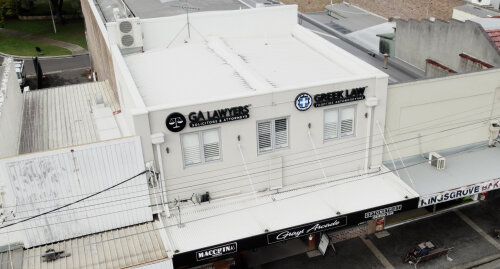Best Whistleblower & Qui Tam Lawyers in Australia
Share your needs with us, get contacted by law firms.
Free. Takes 2 min.
Or refine your search by selecting a city:
List of the best lawyers in Australia
About Whistleblower & Qui Tam Law in Australia
Whistleblower and Qui Tam laws in Australia are designed to protect individuals who report misconduct, fraud, or illegal activities within organizations. These laws encourage transparency and accountability by offering protections against retaliation for whistleblowers. The aim is to promote ethical behavior in both the public and private sectors and ensure that individuals can report wrongdoing without fear of repercussions.
Why You May Need a Lawyer
There are several situations where individuals might require legal assistance concerning Whistleblower and Qui Tam laws:
- Understanding legal protections available and how to proceed with a claim.
- Defending against retaliatory actions from an employer or organization.
- Understanding complex legal procedures associated with Qui Tam claims.
- Seeking compensation or reinstatement after being unfairly treated for whistleblowing.
- Ensuring compliance with specific legal norms while making a disclosure.
Local Laws Overview
Australia's legal framework for whistleblowers encompasses several key provisions and acts:
- Public Interest Disclosure Act 2013 (PID Act): This is applicable mainly to public sector whistleblowers, providing a legal framework for disclosure and protection.
- Corporations Act 2001: This contains provisions for whistleblower protection in the corporate and financial sector, offering immunity and ensuring confidentiality.
- Taxation Administration Act 1953: This act includes whistleblower protections concerning tax-related misconduct.
- Various state and territorial laws also provide additional layers of protection for whistleblowers.
Frequently Asked Questions
What is a whistleblower?
A whistleblower is someone who reports unethical, illegal, or unsafe practices within an organization. They often require protection from retaliation as a result of exposing such practices.
What is a Qui Tam action?
Qui Tam is a provision that allows a private individual to file a lawsuit for a fraud against the government, on behalf of the government. In some systems, a whistleblower receives a portion of the recovery as a reward.
What protections are offered to whistleblowers in Australia?
Australian laws provide various protections, including anonymity, compensation, and reinstatement. Acts such as the Corporations Act and PID Act provide specific legal protections tailored to different sectors.
Can a whistleblower remain anonymous?
Yes, under Australian law, there are provisions for whistleblower anonymity, although some limitations may apply based on the specifics of the disclosure.
What happens if an employer retaliates against a whistleblower?
If retaliation occurs, the whistleblower may be entitled to compensation, reinstatement, or other legal remedies through the courts or regulatory bodies.
Is there financial compensation for whistleblowers in Australia?
Unlike in the United States, there is no specific provision for financial incentives for whistleblowers in Australia, although they may receive compensation for any harm suffered due to retaliation.
Are there penalties for false or malicious whistleblowing?
Yes, making false or malicious reports can result in legal consequences, including potential criminal charges and civil liabilities.
What should I include in a whistleblower report?
Reports should be factual and include evidence of the wrongdoing, details of the incident, when and where it occurred, and any witnesses.
How long do the legal proceedings take?
The duration of legal proceedings can vary significantly based on the complexity of the case and the legal processes involved.
Can a whistleblower report to more than one agency?
Yes, in certain situations, a whistleblower can choose to report to multiple agencies, depending on the nature of the wrongdoing and the jurisdiction.
Additional Resources
The following resources can provide additional help and guidance for individuals dealing with Whistleblower and Qui Tam issues:
- Australian Securities and Investments Commission (ASIC): Provides information and resources specifically for corporate whistleblowers.
- Commonwealth Ombudsman: Assists with public sector whistleblower reports.
- Taxation Ombudsman: Helps with tax-related whistleblowing issues.
- State and Territory Ombudsman Offices: Offer further assistance tailored to local regulations and agencies.
Next Steps
If you need legal assistance in the area of Whistleblower and Qui Tam laws in Australia, consider the following steps:
- Gather as much evidence and documentation as you can about the misconduct or wrongdoing.
- Contact a lawyer who specializes in employment or corporate law with a focus on whistleblower cases.
- Consider reaching out to relevant governmental bodies or ombudsman services for guidance on making a formal report.
- Maintain confidentiality and be cautious in documenting your disclosure to protect your legal rights.
Lawzana helps you find the best lawyers and law firms in Australia through a curated and pre-screened list of qualified legal professionals. Our platform offers rankings and detailed profiles of attorneys and law firms, allowing you to compare based on practice areas, including Whistleblower & Qui Tam, experience, and client feedback.
Each profile includes a description of the firm's areas of practice, client reviews, team members and partners, year of establishment, spoken languages, office locations, contact information, social media presence, and any published articles or resources. Most firms on our platform speak English and are experienced in both local and international legal matters.
Get a quote from top-rated law firms in Australia — quickly, securely, and without unnecessary hassle.
Disclaimer:
The information provided on this page is for general informational purposes only and does not constitute legal advice. While we strive to ensure the accuracy and relevance of the content, legal information may change over time, and interpretations of the law can vary. You should always consult with a qualified legal professional for advice specific to your situation.
We disclaim all liability for actions taken or not taken based on the content of this page. If you believe any information is incorrect or outdated, please contact us, and we will review and update it where appropriate.
Browse whistleblower & qui tam law firms by city in Australia
Refine your search by selecting a city.
















